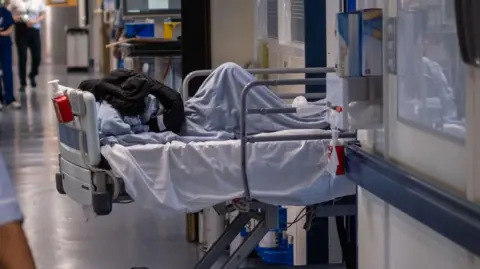Emergency care at NHS trust 'requires improvement'
 PA
PAEmergency care at an NHS trust has been rated "requires improvement" following an unannounced inspection that highlighted 12-hour waits for treatment and patients being cared for in corridors.
A Care Quality Commission (CQC) report followed an inspection in July at looked at Peterborough City Hospital which looked at emergency and other medical care, including older patients.
The CQC said the inspection was in response to concerns about delayed discharges, staff shortages, waiting times, and management of care of people with mental health conditions.
North West Anglia NHS Foundation Trust, which runs the hospital, said it had "continued to implement a programme to improve the patients' experience".
Concerns over patients' corridor care
Inspectors found the hospital's virtual ward programme was a good innovation which had saved 2,500 admissions that would have required beds since it was introduced last year.
The programme enabled patients, particularly frail/older people, to be monitored at home by doctors using video and other technology, such as wearable monitoring kits.
Inspectors also found staff to be "caring", adding that leaders "listened to people who had concerns or complaints and sought ways to improve the service".
However, some patients were still facing long waits for treatment and experienced a lack of continuity in care, the report said.
It added that staff escalated concerns to leaders regarding patients being cared for in corridors and being moved around.
Those in corridors told inspectors they did not always have access to meals that were specific to their dietary requirements.
More than 250 patients were moved to other wards in the middle of the night in just one month which disrupted sleep and slowed recovery, the report said.
 NWAFT
NWAFTStuart Dunn, CQC deputy director of operations in the region, said: "In urgent and emergency care services, although we found leadership had improved, people were waiting too long to be seen, more than 12 hours in some cases, and quite often due to staff shortages.
"Shortages meant the service didn't always identify people who attended the emergency department whose health was at risk of deterioration quickly enough.
"Leaders added [that] capacity problems were behind the issue of managing risks related to people admitted with acute mental health problems."
The overall ratings of the hospital and the trust remained unchanged as "requires improvement".
Jo Bennis, chief nurse at the trust, said: "We have been able to reduce the number of instances where we have needed to provide corridor care and have a dedicated improvement workstream in place to address patient moves, discharge processes and delivering the fundamentals of care.
"We know there is more work to do. We are all committed to making the changes that will give our patients a better experience."
Follow Peterborough news on BBC Sounds, Facebook, Instagram and X.
